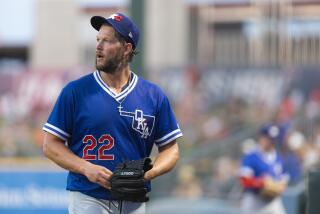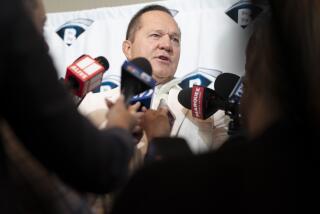Davis Won’t Miss Astrodome, but Astros Might Miss His Bat
- Share via
SARASOTA, Fla. — The Houston Astros portray their changes as a youth movement and rebuilding program.
Glenn Davis, the power-hitting first baseman they traded to the Baltimore Orioles in January, describes it another way.
“I can agree with a philosophy of going with youth and rebuilding, but you still need a foundation, people to build around,” he said at the Orioles’ training base.
“The Astros are just cutting costs and cutting corners because they’re more interested in selling the club.
“I might do the same if I was a businessman, but it’s not fair to the city and fans who regard a baseball club as more than a business proposition.”
The Astros eliminated a significant salary by trading Davis for pitchers Pete Harnisch and Curt Schilling and outfielder Steve Finley. The Orioles eventually signed Davis to a one-year contract for $3.275 million and are expected to work out a multiyear deal before he becomes a free agent at the end of the season.
“The Orioles have taken a lot of steps to build a good relationship, and I have to think they want me for more than one year,” Davis said.
He was drafted by the Orioles as a Jacksonville (Fla.) high school graduate in 1979 but elected to attend Georgia, he said, because the Orioles wanted him as a pitcher--”I loved to hit too much for that”--and he had thoughts of becoming a veterinarian.
“(It’s as if) I did my internship with the Astros and will be opening my practice in Baltimore,” he said. “I feel like I’m starting all over again.”
And this time, the Orioles won’t ask him to pitch. He has averaged 29 homers over the last five seasons, despite playing half his games in the spacious Astrodome and missing two months of the 1990 season because of a pulled muscle. He is the only Houston player to have hit 30 or more homers in three seasons and has averaged one every 18.2 at bats--the 11th-best ratio among hitters with at least 100 home runs.
“I have no regrets about leaving the Astrodome,” Davis said. “It could be a nightmare at times.
“I know I would have hit five to 10 more homers a year playing anywhere else.”
Baltimore’s Memorial Stadium is one of baseball’s leading home run havens, but Davis will play in it for only a season before the club moves to a new stadium near the downtown harbor. “I’ve never hit in Memorial Stadium, but I had heard rumors about being traded to the Angels and I know it would have been fun to play in the Anaheim park,” he said.
“I was in the home run contest before the 1989 All-Star game (there) and the balls were flying out. I hit one about 50 feet over the fence in batting practice and said to myself, ‘Wow, did I do that?’ You could see the ball real well at night, too.”
Davis said that before the trade, most of the rumors were about the Orioles, Angels and New York Mets.
“The Astros kept telling me they wanted to keep me, and every day I’d see in the papers they were trying to deal me,” Davis said. “It was a slap in the face.
“I guess what hurt most was that I strongly felt I’d have a say in where I went, that I’d be part of the decision making. I thought I had earned that, but I never heard anything until I got the call that I’d been traded.
“The Astros gave me the opportunity to play and I don’t want this to sound only like cheap shots, but you always had to fight for whatever you got and it made you feel that you weren’t really respected.
“They never even talked to me about a contract for this year, and having come up in the system and done well, I thought I deserved better. The problem right now is that there’s no one around the club who can make a decision, short of the owner, and he’s only interested in selling.”
Davis predicted that the Astros will pay a heavy price for the lack of experience.
“History proves it takes several years to rebuild, and that’s sad,” he said.
For Davis, however, the trade represents a new beginning, and his contract will help fund a boys’ home he is building in Columbus, Ga., where he lives.
A working ranch that will carry his name, it is scheduled to open in mid-summer and provide an opportunity of the type that helped Davis shed the trauma of a difficult upbringing.
“A lot of people reached their hand out to give me a second chance, and I have the opportunity to do the same,” he said.
“People talk about the big salaries, but to me it’s not what you make but what you do with it that’s important. I may even have the chance now to build a second home, and that’s exciting.”
More to Read
Go beyond the scoreboard
Get the latest on L.A.'s teams in the daily Sports Report newsletter.
You may occasionally receive promotional content from the Los Angeles Times.










